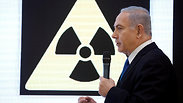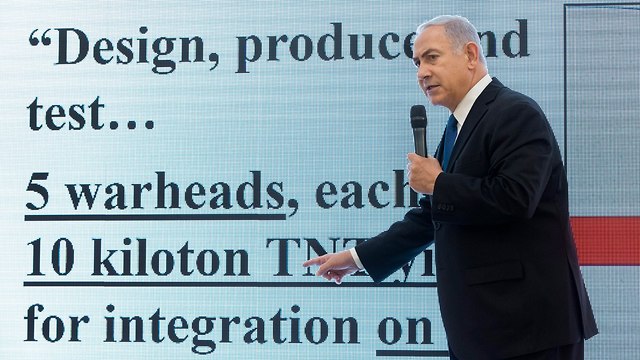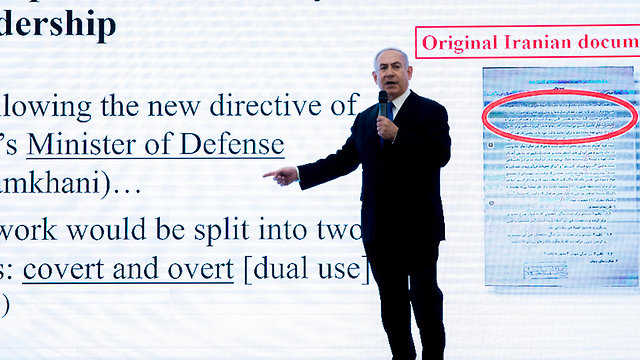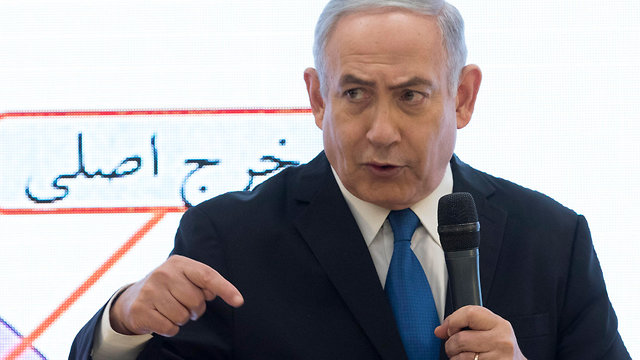
European delegations to review Iranian nuclear archive
After delivering information obtained by Israel on Iran's nuclear program to US President Trump, Netanyahu is expected to hand material over to delegations from Britain, France and Germany. 'We had suspicions, and now they have been verified,' the prime minister tells reporters after revealing that 100,000 documents arrived in Israel three months ago in a Mossad dramatic operation.
After delivering the information to US President Donald Trump, Netanyahu is expected to hand the material over to delegations from Britain, France and Germany for review later this week.
"I said that the world powers' agreement with Iran was bad, not because Iran would violate it but because it would uphold it," the prime minister added.
On Tuesday afternoon, Netanyahu told Fox News that the information was obtained by Israel in February and includes 100,000 documents in Persian. He explained that the documents had to be given to professional translators with knowledge of scientific and technological terms. The information was presented to Trump in early March and was studied simultaneously by the US and Israel.
In an interview to CNN, the prime minister was asked whether Israel was preparing for a war with Iran. He replied that no one was interested in such a development and that Iran was the one changing the rules of the game in the region.
The UN atomic watchdog declined on Tuesday to directly address Netanyahu's accusations that Iran was breaching its landmark nuclear deal with major powers.
"In line with standard IAEA practice, the IAEA evaluates all (nuclear) safeguards-relevant information available to it," said a spokesman for the International Atomic Energy Agency, which is policing the deal. "However, it is not the practice of the IAEA to publicly discuss issues related to any such information."
In a report issued in December 2015, shortly before the pact went into effect, the IAEA said "a range of activities relevant to the development of a nuclear explosive device were conducted in Iran prior to the end of 2003 as a coordinated effort."
Those activities continued after 2003, though in a less coordinated manner, and there was no credible indication of any beyond 2009, the IAEA said at the time. The spokesman's statement on Tuesday reiterated the 2015 report's findings.
A senior state official said, "We are in a battle with Iran. Not just concerning the nuclear program, but in other areas as well, and this puts the determination of both sides to the test. We back our red lines with action."
The official added that while an end to the battle with Iran was nowhere in sight, the exposure of the nuclear information likely didn't escalate the situation vis-à-vis Iran.
'We have never had this much intelligence'
A senior intelligence source told reporters that the intelligence community had never received this much intelligence information, and that not all of it had been processed and studied yet.
According to the senior source, the information obtained by Israel serves as proof of the existence of a nuclear weapon program which the Iranians began working on before 2003. When they halted their nuclear program that year, they dissolved the weapon program into small components but kept working on the plan and deceiving the entire world.
This leads to the conclusion, the senior intelligence source said, that they may have been doing the exact same thing after signing the nuclear agreement in 2015. The source added that the material included detailed instructions and images for the production of a nuclear weapon, but that they were not presented on Monday so that the information wouldn’t fall into unwanted hands of other countries and used by terrorists or countries for their own nuclear programs.
The existence of the archive and its concealment, the official added, indicate that Iran planned to continue its military nuclear program. It preserved the material and the results of the simulations and calculations so that once the Iranians renew the nuclear program, they won't have to rely on their memory or start over, but pick up from where they left off in 2015.
The existence of the archive is a violation of the nuclear agreement, because if Iran had really been prepared to disarm, it would have handed the archive and a considerable part of its documents to the IAEA.
The documents included new details on activities and people in Iran that were involved in the nuclear program and in the Iranian weapon program, and Iran will now have to provide information it wasn't required to provide in the past, to the IAEA for example.
The official added that before signing the nuclear agreement, Iran provided false answers to questions presented by the IAEA. While it was clear that the Iranian declaration were false, but now Israel has evidence that each of those statements was false.
Efforts to halt funding to Iran
A state official said Israel didn’t know what President Trump was planning to do about the nuclear agreement. According to the source, however, the pressure on Iran should be increased as it endangers world peace and continuing the agreement would lead to an Iranian nuclear arsenal.
The state official said it was necessary to stop the funding, not only of the Iranian nuclear program, but of the entire war waged by Iran to take over countries in the Middle East and implement a violent policy against its rivals, led by Israel.
The official estimated that if Trump decided to withdraw from the nuclear agreement, the funding of Iran's military adventures and nuclear program would be halted, as the sanctions would be reimposed and the Islamic Republic will be tens of billions of dollars short to fund its adventures in Syria, Lebanon, Iraq and Yemen.
The source further added that if Trump decided to walk away from the agreement, it would take 180 days for the sanctions to be resumed. In other words, the Europeans, the Iranians and the Americans would have enough time to amend the agreement or reach other agreements that would rectify the flaws in the nuclear deal.
A nuclear expert noted that if Trump decided to quit the nuclear agreement with Iran, other countries would have no other choice and would have to choose between doing business with the United States or doing business with Iran. So even if those countries won't want to quit the agreement, they would eventually be forced to follow in America's footsteps.
British Foreign Secretary Boris Johnson said Tuesday that Netanyahu's presentation on Iran’s past research into nuclear weapons technology "underlines the importance of keeping the Iran nuclear deal’s constraints on Tehran’s nuclear ambitions.
"The Iran nuclear deal is not based on trust about Iran’s intentions; rather it is based on tough verification, including measures that allow inspectors from the International Atomic Energy Agency unprecedented access to Iran’s nuclear program.
"The fact that Iran conducted sensitive research in secret until 2003 shows why we need the intrusive inspections allowed by the Iran nuclear deal today. The verification provisions in the Iran nuclear deal would make it harder for Iran to restart any such research. That is another good reason for keeping the deal while building on it in order to take account of the legitimate concerns of the US and our other allies."
Reuters contributed to this report.














